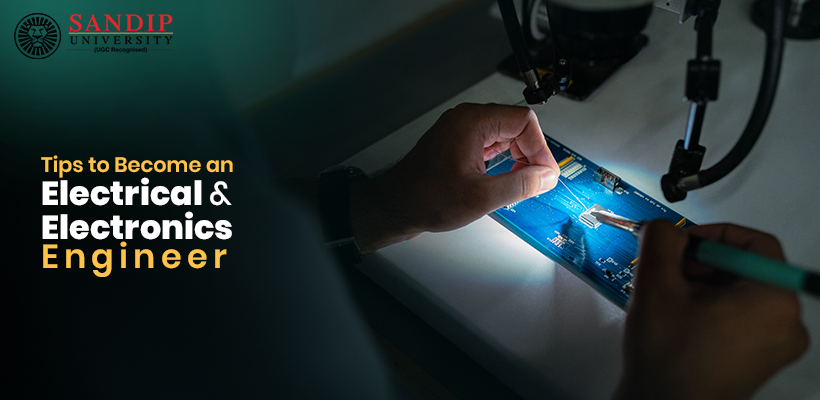Electrical and electronics engineering is one of the most advanced and progressive fields today. Today, we simply cannot imagine a life without electronics. There is a lot of scope and opportunities in this field. A career in electrical engineering can be extremely lucrative with the right qualifications. If you think you have what it takes to be an electrical and electronics engineer, here is how you can make your career goals come true.
What is Electrical and Electronics Engineering?
Electrical and electronics engineering is the branch of engineering that deals with the application of electricity in a practical setting in electronics. In the scope of engineering, the difference between electrical and electronics engineering is determined by the power of the electric current utilised in the application.
Electrical engineering deals with “heavy current” which includes electricity and power grids. On the other hand, electronics engineering is concerned with “light current” in terms of telecommunication, radars, computing systems etc. You can pick the branch most suited to your career goals based on this distinction.
Start your Journey at 10+2
You need to pursue science stream after class 10 to be eligible for electrical engineering courses after 12th. This is the eligibility criteria for electrical and electronics engineering:
- Candidates who have cleared 10+2 in science stream with Physics, Mathematics and Chemistry as compulsory subjects from a reputed university or education board with minimum 45% aggregate marks.
- Candidates who have a 3-year Diploma qualification in the relevant field with minimum 45% aggregate marks.
- Appeared for entrance exams like CET, JEE Mains and JEE Advanced.
- Appeared for entrance exams held by private universities, in case you are considering a private university.
How to Choose the Right Electrical and Electronics Engineering College?
India is a hub of engineering colleges. However, merely any engineering college will not do. You need to pursue electrical and electronics engineering from a reputed and renowned college to make your qualifications count. Here are some markets you should look for to identify top engineering colleges in India:
- Futuristic Curriculum: A leading college will make sure that their course curriculum is in sync with industry standards. The curriculum will also include skill-enhancement activities and practical sessions.
- Placement Record: Leading colleges always provide students with 100% placement assistance. They have a dedicated placement cell to train students and collaborate with corporates to participate in their annual campus placement drives.
- Focus on Overall Student Development: The right qualifications are just a part of the whole picture. You need to be a dynamic professional to attract career opportunities from leading companies. Look for colleges that conduct robust extracurricular activities to drive student development.
- Industry Tie-ups: Good colleges tie up with leading companies to provide students with industry training, mentorship with industry leaders, internships, and placement opportunities.
- Top Facilities and Amenities: A good campus infrastructure will positively impact your student experience. Look for colleges that have a wonderful campus with high-tech labs and more.
Skills Needed to Become an Electrical and Electronics Engineer
Engineering is a hands-on field and you will have to be on the top of your game to make it in a highly competitive environment. If you pursue one of the many professional courses for electrical engineers, you will end up honing your practical skills in labs. However, you also need soft skills to make it in the industry. These are some of the skills you will need to develop to become a successful electrical and electronics engineer:
- Problem-solving skills
- A methodical and mathematical mind
- Critical thinking
- Stellar communication skills
- IT skills
- Excellent time management
- A budding interest and curiosity towards technology
Job Opportunities for Electrical Engineers
After completing your education, you can look for jobs that suit your qualifications and skills. The world is welcoming newer and better technologies in this branch of engineering. There are ample career opportunities for electrical and electronics engineers today.
Top Jobs for Electrical and Electronics Engineers
- Electrical Engineer
- Power Engineer
- Instrumentation Engineer
- Telecommunication Engineer
- Micro Electrical Engineer
- Electrical Design Engineer
- Electronics Engineer
Top Global Recruiters for Electrical and Electronics Engineering
- TCS
- LG Electronics
- Hitachi
- Intel
- Infosys
- Bharat Electronics
- L&T Technology Services
- Apple Inc.
- Samsung Electronics
- Toshiba
Electrical and Electronics Engineering at Sandip University
Sandip University is home to one of India’s leading engineering colleges. We offer the following programs in electrical and electronics engineering:
- Tech Electrical Engineering
- Tech Electronics Engineering
- Tech Electrical Engineering in Electrical Power System
You can opt for undergraduate or postgraduate programs, depending on your career goals. The course curriculum of our programs is designed bearing in mind the current and futuristic challenges in these industries. We have some of the best engineering labs in Nashik with labs dedicated to different subjects within electrical and electronics engineering.
Our students receive 100% placement assistance through annual placement drives. They undergo rigorous skill development and personality development activities before these placement drives. This helps them crack corporate interviews on the get go.
You can do some research and opt for a tour of our 250+ acre campus. This will help you make an informed decision about how Sandip University can help you make a bright and global career in electrical and electronics engineering. Good luck!

